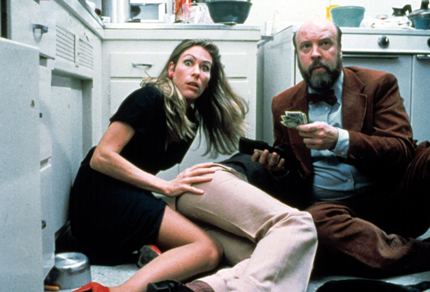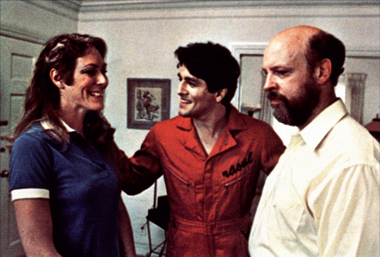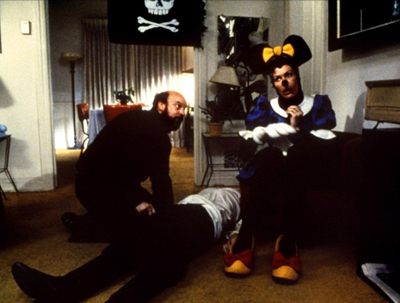
 |
|
|
|
Too frequently overlooked in the ranks of '60s student/experimental filmmakers is director Paul Bartel, who made a bigger impact as an actor in comedies. Bartel's short subjects share with those of Brian De Palma a self-conscious awareness of cinema culture, but the directors took different career paths. De Palma stayed in New York to make highly individualistic (and well-reviewed) comedies with future stars like Jill Clayburgh and Robert De Niro. Bartel was eventually tapped by Roger Corman's brother Gene to make the unsettling black comedy-cum-horror opus called Private Parts (1972). Even considering the wide latitude of subject matter in alternative movies of the early '70s, audiences didn't know what to make of a scene where the Norman Bates-like hero injects a plastic blow-up sex doll with human blood. But Private Parts brought Bartel into Roger Corman's New World Pictures, where his 1975 Death Race 2000 initiated a new sub-genre of cynical road-race movies. Bartel also acted in Corman pictures, playing mostly effete, clueless authority figures, often opposite his close friend and former Warhol actress Mary Woronov. 
Roger Corman is famous for pioneering lucrative new exploitation film territory, yet took so few financial chances that he missed out on a few winners. Corman made the first cult biker and drug pictures for American-International, but was intimidated by the price tag for Easy Rider and thus left others to reap that film's enormous profits. Corman also turned down Bartel's proposed project Eating Raoul, a ribald but culturally on-the-nose hit comedy about the sex-crazed 1970s. Bartel approaches his risqué subject almost as if making a Laurel & Hardy film. Scenes are linear and deliberate, and the amusing relationship between married couple Paul and Mary Bland (Bartel & Woronov) is played without irony. Paul is fired from his job at a wine store and Mary is a nurse sick of fending off sexually aggressive patients. Their dream of opening a restaurant of their own seems far out of reach. As the Blands' happily describe their own bedroom activities as "a little kissing and hugging", they are horrified at the influx of swingers into their apartment building. When a man from an orgy down the hall tries to rape Mary, Paul kills him with an iron skillet. Realizing that this new class of upscale sex fanatics has money, the Blands decide to lure more swingers to their apartment with salacious want ads. Mary's helpful friend Doris the Dominatrix (Susan Saiger) advises them about meeting clients' sex fantasies, and to only accept cash. All goes well until Mary and Paul meet Raoul Mendoza, a fake security consultant who robs them the very night after he changes their locks. Catching his clients in the act of murder, Raoul immediately suggests a partnership: he can make more money by selling the victims' bodies to a pet food company. The sound of cracking skulls means cash in the bank, but the new business arrangement falters when Raoul develops a healthy lust for Mary. 
The patently goofy Eating Raoul takes aim at the Southern California swinger culture of the late 1970s. The show begins with a montage of suggestive Hollywood signs and newspapers that cater to the sex trade; seemingly everyone Mary and Paul meet is into a hedonistic lifestyle. Mary dresses attractively to apply for a bank loan, and the loan officer Mr. Leech (Buck Henry) tries to maul her right in his office. Like a new race of sex-crazed Pod People, swingers bombard the Blands with lewd propositions and invites to orgies just down the hall. Paul Bartel and Richard Blackburn's comic screenplay plays with the notion that these sex fanatics aren't human, and are therefore open season for Paul's iron skillet. The Blands enter the serial homicide business with open eyes, observing proper middle-class values. Mary reminds Paul to buy another skillet, so they won't be cooking with the one they use to kill people. Bartel's satire remains amusing because it expresses the true nature of ambition in a society divided into Those That Eat Well and Those That Get Eaten. A bourgeois couple gets together and works as a team to reach their goal of financial independence. Mary and Paul are faithful to each other and their dream. The whole point is to get what they want. Why should they worry about the law or morality, if nobody else does? Meanwhile, the laughs never let up. Obvious comedy elements include the kinky costumes Mary must don to receive guests with special needs -- a leather bondage rig, a peasant outfit to play a victim of Nazi torture, even a giant Minnie Mouse costume. The sex content is mostly in the frank dialogue, although there is some nudity here and there. Mary and Paul remain morally aloof even when ushered into a swinger party thrown by the rowdy Mr. Swine (disc jockey "The Real" Don Steele). A married guest (Edie McClurg) suggests a foursome arrangement with her husband, an offer that Paul parries with the information that he and Mary are "into St. Bernards." Woronov and Bartel are a charming acting team, sort of an Ozzie and Harriet of the post-John Waters era. They simply want to earn a living like everybody else, and enter the sex trade / murder game in a spirit of deadpan practicality. Making a strong impression as the amorous con man/thief/body snatcher is Robert Beltran. An enterprising fellow with a nose for a shady deal, Raoul is delighted to turn local swingers into a source of profit. As silly as it may be Eating Raoul is fairly accurate about the Hollywood vibe that attracts those interested in glamour and sex. Doris, Mary, Paul and Raoul are simply members of a cottage industry making a living from the very real swinger lifestyle. 1 Also stepping in for a brief role is Ed Begley Jr., as a client who wants to play hippie. Director John Landis has a brief walk-on was well. 
As befits an off-kilter satire Eating Raoul represents Southern California's sterile, no-personality apartments as flat-lit and painted in bright pastels. Mary and Paul attend the wild party of the wealthy Mr. Swine in search of a few new customers, but through creative mass homicide turn the midnight hot tub orgy into a profit bonanza. Doris the Dominatrix is right when she says that those swingers have plenty of money -- the Blands make their bundle selling off their victims' fancy automobiles! Criterion's Blu-ray of Eating Raoul captures the clean lines of Paul Bartel's comedy of murders. The colors pop and the monaural soundtrack is bright and clear. The extras include two rarities, Bartel's short films The Secret Cinema and Naughty Nurse. Made in 1966, The Secret Cinema is a bona-fide experimental classic, a nearly perfect exercise in humorous paranoia, with an inspired central idea. The print, unfortunately, has some splice damage (unless the jump-cuts are intentional). As Paul Bartel passed away in 2000 his co-screenwriter Richard Blackburn, production designer Robert Schulenberg and editor Alan Toomayan are heard on a commentary. Blackburn is the noted writer and director of the cult horror classic Lemora: A Child's Tale of the Supernatural . Criterion disc producer Issa Clubb has assembled a making-of interview featurette Cooking Up Raoul that features interviews with Mary Woronov, Robert Beltran and Edie McClurg. An older interview with Bartel and Woronov is present as well. In addition to a trailer we get an amusing reel of gags and outtakes. The package insert folds out like a menu, and contains a brief essay by David Ehrenstein.
On a scale of Excellent, Good, Fair, and Poor,
Eating Raoul Blu-ray rates:
Footnote:
1. It existed! It was real. Although it was obvious that somewhere in the San Fernando Valley people were living an existence straight out of Boogie Nights, my personal experiences in 1970s Hollywood brought me only once or twice in very brief contact with the wild side. I once helped an apartment neighbor get his 16mm projector going during a 'private party' he was having with three young and unusually friendly women, and turned down his invitation to stay out of common sense as well as instinct. Much later, a friend invited me to see his dentist's new screening room, which turned out to be a converted bedroom outfitted with what in 1975 passed for a quality video projector. The dentist had plenty of money and was disappointed to find out that we 'film people' didn't have access to lots of girls he could meet. He assumed that starving apprentice film editors had swinger connections.
I know, I know, not very exciting!
Reviews on the Savant main site have additional credits information and are often updated and annotated with reader input and graphics. Also, don't forget the 2011 Savant Wish List. T'was Ever Thus.
Review Staff | About DVD Talk | Newsletter Subscribe | Join DVD Talk Forum |
| ||||||||||||||||||